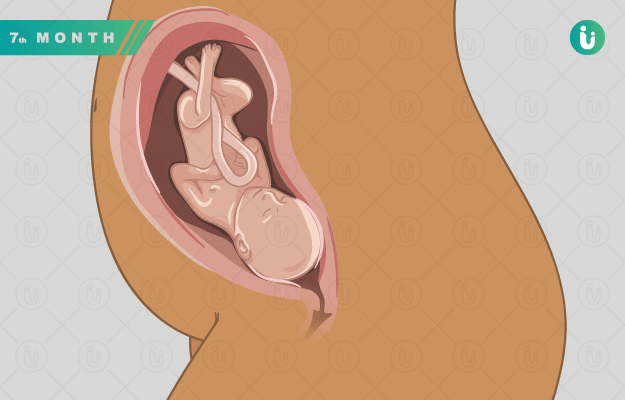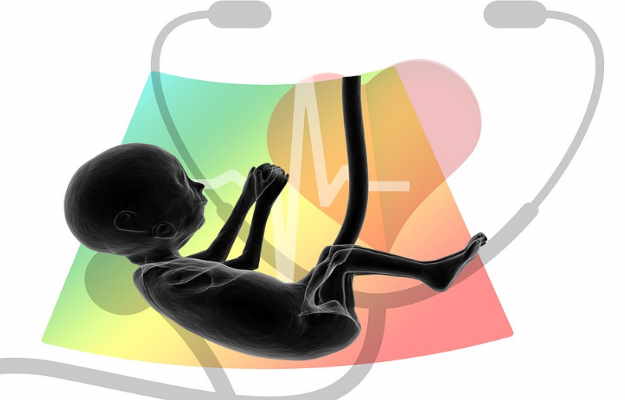Premature labour is also called preterm labour. In this, the baby can be born before the completion of 37 weeks of pregnancy. If the baby is born prematurely, it is called preterm birth or premature delivery.
(Read more: Normal delivery)
Premature birth can be the cause of many problems in babies. India has the highest number of such cases in the world. As such, women are given complete information about this condition occurring during pregnancy, including why preterm birth occurs, symptoms of premature labour, what to do in case of preterm labour, tests to find out the risk of premature labour, the risks to a premature baby and the risk of having preterm birth in the following pregnancy.
- What is preterm birth
- Is premature birth common in India?
- Causes of preterm birth
- Symptoms of preterm birth
- What to do if you have a preterm delivery
- Tests to determine preterm birth
- Medical conditions that necessitate preterm delivery
- What is the risk of preterm birth in subsequent pregnancies?
What is preterm birth
If the uterus begins to open due to pressure in the uterus before 37 weeks of pregnancy, it is called premature labour or preterm labour.
In such cases, the woman usually gives birth to the baby before the completion of 37 weeks. This is called the premature birth of the baby. In medical terms, this is called preterm birth.
But every pregnant woman who experiences preterm labour does not give birth to a premature baby. About 50% of women who experience preterm labour give birth only after 37 weeks of pregnancy or the completion of their gestation period.
If the pregnant woman or the child in the womb experience any problem, the baby may be delivered prematurely by the doctor. This is about one-fourth of the cases of preterm births. The doctor may opt for a caesarean delivery before the completion of 37 weeks of gestation in case of any complications to the pregnant woman or her baby. This option of premature delivery is chosen in cases of serious medical conditions, pre-eclampsia or stunted growth of the baby in the womb.
(Read more: Weeks of pregnancy)
Is premature birth common in India?
Cases of premature birth are more common in India than in most other countries. India alone accounts for a quarter of the cases of premature delivery worldwide. According to the data received from the World Health Organization, about 35,19,100 babies are born prematurely in India annually.
More than 60% of preterm deliveries occur in Africa and South Asia. However, preterm birth is also becoming a big problem in other countries of the world. In low-income countries, about 12% of babies are born prematurely, while in high-income countries the figure is around 9%.
(Read more: Months of pregnancy)
Causes of preterm birth
Scientists have not yet been able to find the cause of premature birth. However, some factors have been found that increase the chances of having a preterm birth, including:
1. Premature birth due to infection
Premature birth can occur due to infection of the sex organs. In the womb, the baby is in the amniotic sac, which is a fluid-filled sac that protects the baby in the uterus. Bacteria in the passage of sex organs can produce some substances that weaken these sacs. Sometimes, it becomes so weak that it bursts prematurely.
In many cases, the amniotic sac does not rupture but the uterus gets infected. This infection increases the chances of giving birth to a premature baby.
(Read more: Swelling in pregnancy treatment)
You should get tested for chlamydia and gonorrhea (sexually transmitted infections) before or at the start of pregnancy. If you are suffering from any of these, you and your partner should get it treated immediately. Once it's treated, you should get tested again to your satisfaction. After this, you must use a condom to have sex during pregnancy.
(Read more: Frequent urination during pregnancy)
Apart from this, if any of your children have been born prematurely before this, then you should get tested for bacterial vaginosis, a type of vaginal infection. Several studies suggest that treating bacterial vaginosis in the second and third trimesters of pregnancy reduces the risk of having preterm labour again.
In addition to bacterial vaginosis, tests for trichomoniasis (another sexually transmitted infection) may also be done, but only if you’re showing symptoms associated with it.
Asymptomatic bacteriuria, a type of urine infection in which more bacteria than normal are found in the urine, but still no symptoms are seen, can also be a cause of preterm birth.
In addition to the above-mentioned vaginal diseases, infections such as kidney infection, pneumonia, and appendicitis also increase the risk of preterm birth.
(Read more: Early pregnancy symptoms)
2. Causes of preterm birth apart from infection
- Problems in the placenta, such as placenta previa, placenta accreta and placental abruption, etc.
- Enlargement of the uterus, when you have twins in your womb or there is more amniotic fluid.
- Disturbances in the structure of the cervix and uterus.
- Having surgery on the lower abdomen during pregnancy, such as to remove lumps in the appendix, gallbladder or ovaries.
Risk factors for having a premature baby (preterm birth)
There are many factors that increase the chances of a baby being born prematurely. But keep in mind that it is not necessary that if any of these factors apply to you, then your baby will be born prematurely. Inversely, in 50% of preterm births, none of these factors is present during pregnancy.
As mentioned earlier, the reasons for preterm birth are not known yet, but the chances of it happening increase in the following situations:
- You have had a previous preterm delivery.
- You are pregnant with one or more children.
- You are under 17 or over 35.
- You were underweight before becoming pregnant or did not gain weight during pregnancy.
- Vaginal bleeding in the first or third trimester of pregnancy. (Read more: Bleeding in pregnancy)
- There was a problem of anemia in pregnancy.
- Smoking cigarettes or consuming alcohol during pregnancy.
- There is not much time between your previous and current pregnancy, especially if you became pregnant again less than 6 months after the delivery of the last child.
- Not taking prenatal care. (Read more: Pregnancy diet)
- Getting pregnant after any treatment for pregnancy such as IVF.
- The pregnant woman belongs to a low-income group.
- Being stressed during pregnancy. High stress in pregnancy can produce certain hormones that cause uterine contractions to start.
- Women who are victims of domestic violence are more likely to deliver prematurely.
- Women who work at night and women who do more physical work have a higher risk of premature labour.
- Genetic factors are also a major reason for preterm birth.
(Read more: Pregnancy Test)
Symptoms of preterm birth
In preterm labour, you may see the following symptoms before the completion of the specified time period of pregnancy:
- Having more discharge than normal from the vagina. (Read more: Vaginal discharge during pregnancy)
- Changes in vaginal discharge, especially if the discharge is watery, sticky, or contains blood.
- Bleeding and blood clots in pregnancy.
- Pain in the lower abdomen, abdominal cramps like menstruation, and constant pressure on the abdomen.
- Pressure in the pelvic area.
- Persistent mild pain in the back. (Read more: Back pain treatment in pregnancy)
Sometimes, it is not clear why these symptoms are occurring, as symptoms such as pelvic pain or lower back pain are common during pregnancy. But to avoid any major trouble, you should immediately consult your doctor if such symptoms appear.
(Read more: Fetal development in pregnancy)
What to do if you have a preterm delivery
If, before the completion of 37 weeks of pregnancy, pressure starts to build in the abdomen or water starts coming out of the vagina, then you should contact the doctor or a hospital immediately. If such a situation arises in the night, then you should not wait till morning and reach the nearest hospital as soon as possible. If the woman is alone in the house, she should take someone's help or call an ambulance.
(Read more: Headache treatment during pregnancy)
Tests to determine preterm birth
Two types of tests can detect the risk of premature labour in women. Women who feel the symptoms of premature labour can confirm it by doing these tests. It is beneficial for you to undergo these tests because if they show that you are not at risk of preterm delivery, then all the worries about premature labour can be eased and you are also saved from unnecessary treatment.
Many health organizations do not consider it appropriate for all pregnant women to have such tests. Studies have shown that these tests do not tell much in women who are not at high risk of premature labour or do not feel symptoms. Know more about these tests:
1. Checking the length of the cervix by ultrasound
In the first checkup after conception, your doctor examines the cervix. If they suspect any problem, they recommend getting an ultrasound done to confirm it. If the cervix is dilated and opened up on ultrasound, the chances of a preterm delivery increase. (Read more: When to get an ultrasound during pregnancy)
Also, your doctor may ask you to have an ultrasound done if the cervix is abnormal or small. Pelvic pain, cramps, back pain, excessive discharge of viscous fluid from the vagina and blood clots are all considered symptoms of changes in the cervix.
If you see any changes in the cervix on the ultrasound, the doctor may advise you to reduce physical work and activities. Apart from this, you may be asked not to have sex. Depending on your health status and that of your baby, your doctor may ask you to do another ultrasound after a few weeks.
If you feel changes in your cervix without contractions before 24 weeks of pregnancy, your doctor may order a "Cerclage" (a method to close the cervix). In this method, the cervix is closed by stitching with the help of thread. In addition to the risk involved in this process, there are also many advantages and disadvantages involved.
If you've had a problem with cervical enlargement (cervical insufficiency) before, you may benefit from a cerclage. It can be done as soon as the first trimester is over. If you’ve previously had a baby born before 34 weeks, then the doctor will keep checking you regularly in this pregnancy and may perform the procedure if needed before 23 weeks of pregnancy. Consult a doctor to discuss this further.
Vaginal progesterone use in women with narrowing of the cervix may reduce the risk of preterm delivery. (Read more: Exercise during pregnancy)
2. Fetal Fibronectin Screening or FFN
This test is usually done for women who are experiencing symptoms of preterm labour. Fetal fibronectin is a protein produced by the fetal membrane. If between 24 and 34 weeks, fetal fibronectin is found to be high in samples of your cervix and vaginal discharge, you are at higher risk of preterm delivery.
In the event of a positive FFN result, your doctor may give you corticosteroids to stop labour.
If this test has a negative result, it means that your chances of delivery in the next two weeks are very low. A negative result of this test clears all your doubts and saves you from unnecessary hospital treatment.
(Read more: Avoid these habits to ensure a safe and healthy pregnancy)
Medical conditions that necessitate preterm delivery
Sometimes, situations can arise in pregnancy that make doctors advise you to deliver the baby prematurely. Your doctor may suggest a preterm birth for the better health of you and your baby and save you or your baby from many risks by doing so.
The doctor may suggest premature birth in the following situations:
- Failure of the child to develop properly in the womb.
- Deformity in the baby inside the womb.
- Any medical condition developing in the pregnant woman due to which it is safer for the child to be born immediately.
- Prevalence of chronic diseases in the pregnant woman, such as stress, diabetes, anemia, nephritis (inflammation of the kidney), etc. (Read more: Gestational Diabetes)
- Injuries to the lower abdomen of the pregnant woman.
- Pre-eclampsia in pregnancy (disease caused by high BP in pregnancy).
(Read more: Foods to reduce and control blood pressure)
What is the risk of preterm birth in subsequent pregnancies?
Once preterm delivery occurs, the chances of it happening again increase significantly. There is currently no way to prevent this. In your second pregnancy, your doctor will keep a close eye on your condition and try to reduce your worries about this condition. If necessary, the doctor may put a stitch in the uterus as a preventive measure.
(Read more: Doctor's checkup during pregnancy)
If you stop smoking and using other narcotic drugs, you can reduce your risk of this problem.
(Read more: Foods to eat and avoid during pregnancy)
Find Obstetrician and Gynaecologist in cities
- Obstetrician and Gynaecologist in Bangalore
- Obstetrician and Gynaecologist in Mumbai
- Obstetrician and Gynaecologist in Ghaziabad
- Obstetrician and Gynaecologist in Chennai
- Obstetrician and Gynaecologist in Pune
- Obstetrician and Gynaecologist in Delhi
- Obstetrician and Gynaecologist in Hyderabad
- Obstetrician and Gynaecologist in New Delhi
- Obstetrician and Gynaecologist in Gwalior
- Obstetrician and Gynaecologist in Gurgaon
Doctors for Preterm birth

Dr. Ayushi Gandhi
Obstetrics & Gynaecology
4 Years of Experience

Dr. Anjali
Obstetrics & Gynaecology
23 Years of Experience

Dr.Anuja Ojha
Obstetrics & Gynaecology
20 Years of Experience












































